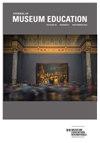Education and Activism: One and the Same?
IF 0.6
Q3 EDUCATION & EDUCATIONAL RESEARCH
引用次数: 0
Abstract
When Erica Robenalt, David Farrell-Banks, and Katie Markham – the guest editors of this issue – approached the Journal of Museum Education (JME) with a collection of articles on “Activist Pedagogies,” it promised to be a natural fit. The Museum Education Roundtable (MER) has long published work on the intersections of museum education and social change. In fact, its nearly 50-year publication history is a record of increasing “museum activism,” as the guest editors define it: “the practice undertaken by museums to influence and alter future practice, engaging with social needs.” The founding of MER in 1973 was one reflection of widespread activism then taking root within the growing community of museum educators, as they began to build professional networks, establish principles, and address shared challenges. With each passing decade since, it is easy to discern in the pages of the JME a deepening concern with social conditions and social change. In 1984, Mary Ellen Munley, writing on her participation in the American Association of Museum’s two-year commission study “Museums for a New Century,” noted in these pages that one of the report’s core principles was “the notion of the museum in service to society” as “a guiding force for the near future.” The conclusions of this US-based commission were similar to those reached earlier by ICOM-CECA in its 1977 colloquium “Museums and Social Life,” during which then-secretary Luis Monreal asserted that “museums are institutions that are part of their society and not marginal... the museum must serve society.” Each decade since has brought an increased intensity of focus on inclusion, representation and access in museum education, efforts which our guest editors might term “museum activism.” After the publication of “Excellence and Equity” in 1992, a chorus of voices in this journal and elsewhere argued for the importance, even the requirement, of museum educators’ engagement in issues of civic life and social justice. Growing in strength into the “oughties” and the 2010s, this “turn to activism” brought with it JME issues that focused on topics of justice and social import: “Building Diversity in the Museum” (2009); “Engaging Visitors to Create Positive Futures” (2013); “Shared Authority: The Key to Museum Education as Social Change” (2013); “Identifying and Transforming Racism in Museum Education” (2017); “Museums as Allies: Mobilizing to Address Migration” (2019); “Museums and Public Climate Action” (2020); “Queering the Museum” (2020); and “Disability Justice in Museum Education: Re-Framing Accessibility as Anti-Ableism” (2022), among others. These and other reflections of practice in the JME are one strand of evidence that museum education and activism have been closely aligned for some time. Even so, the guest editors note that museums are a place where “innovation from activists. in particular, has sometimes been suppressed.” Certainly, it doesn’t take too much memorysearching to surface instances in which museum institutions have enacted constraints on activism, whether on specific educational activities or for institutions as a whole. These constraints are especially evident where work crossed the boundary from “museum activism” – concerned with the profession and practice of museum education itself – to “museums in activism,” where the intended outcome was to produce a broader social effect, outside the museum walls.教育与行动主义:是一回事吗?
当这期杂志的客座编辑Erica Robenalt, David Farrell-Banks和Katie Markham带着一组关于“激进主义教育学”的文章来到《博物馆教育杂志》(JME)时,它承诺是一个自然的选择。博物馆教育圆桌会议(MER)长期以来一直发表关于博物馆教育与社会变革交叉点的工作。事实上,它近50年的出版历史记录了越来越多的“博物馆行动主义”,正如客座编辑所定义的那样:“博物馆采取的影响和改变未来实践的做法,参与社会需求。”1973年成立的MER反映了广泛的行动主义,当时在不断壮大的博物馆教育工作者群体中扎根,因为他们开始建立专业网络,建立原则,并解决共同的挑战。从那以后的每一个十年,我们都很容易从《经济学人》的文章中看出,人们对社会状况和社会变革的关注在不断加深。1984年,玛丽·艾伦·芒利(Mary Ellen Munley)在参与美国博物馆协会(American Association of Museum)为期两年的委托研究《新世纪的博物馆》(Museums for a New Century)时写道,该报告的核心原则之一是“博物馆为社会服务的概念”,是“不久的将来的指导力量”。这个总部位于美国的委员会的结论与ICOM-CECA早前在1977年的“博物馆与社会生活”研讨会上得出的结论相似,当时的秘书路易斯·蒙雷亚(Luis Monreal)在会上断言:“博物馆是社会的一部分,而不是边缘……博物馆必须为社会服务。”自那以后的每一个十年,人们都越来越关注博物馆教育中的包容性、代表性和可及性,我们的特邀编辑将这些努力称为“博物馆行动主义”。1992年《卓越与公平》发表后,在本刊和其他地方,人们齐声呼吁博物馆教育工作者参与公民生活和社会正义问题的重要性,甚至是必要性。在“20世纪60年代”和2010年代,这种“转向行动主义”的力量不断增强,随之而来的是JME关注正义和社会重要性的议题:“在博物馆中建立多样性”(2009年);“吸引游客创造积极的未来”(2013);“共享权威:作为社会变革的博物馆教育的关键”(2013);“博物馆教育中的种族主义识别与转化”(2017);“博物馆作为盟友:动员起来解决移民问题”(2019);“博物馆与公共气候行动”(2020);“酷儿博物馆”(2020);以及“博物馆教育中的残疾正义:将无障碍重新定义为反残疾主义”(2022年)等。这些和其他关于JME实践的反映是博物馆教育和行动主义在一段时间内紧密结合的证据之一。即便如此,客座编辑指出,博物馆是一个“来自活动人士的创新”的地方。特别是,有时会被压制。”当然,不需要太多的记忆搜索就能发现博物馆机构对行动主义的限制,无论是对特定的教育活动还是对整个机构。这些限制在从“博物馆行动主义”(关注博物馆教育本身的专业和实践)到“行动主义中的博物馆”(其预期结果是在博物馆墙外产生更广泛的社会影响)的工作跨越边界时尤为明显。
本文章由计算机程序翻译,如有差异,请以英文原文为准。
求助全文
约1分钟内获得全文
求助全文
来源期刊

Journal of Museum Education
EDUCATION & EDUCATIONAL RESEARCH-
CiteScore
1.20
自引率
16.70%
发文量
34
期刊介绍:
The Journal of Museum Education (JME) is the premier peer-reviewed publication exploring and reporting on theory, training, and practice in the museum education field. Journal articles—written by museum, education, and research professionals—explore such relevant topics as learning theory, visitor evaluation, teaching strategies for art, science, and history museums, and the responsibilities of museums as public institutions. Published 4 times a year, each issue consists of a guest edited section focused on a specific theme and articles about new research, current trends, tools, frameworks, and case studies, perspectives, and book, exhibit, and program reviews.
 求助内容:
求助内容: 应助结果提醒方式:
应助结果提醒方式:


